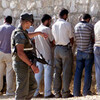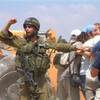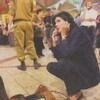
Weekly report on human rights violations
10 July 2003
This week Israeli forces killed 2 Palestinian civilians in the West Bank, fired at Palestinian civilians from miltary checkpoints, conducted a series of incursions into Palestinian areas, razed agricultural land in the Gaza Strip, indiscriminately shelled Palestinian residential areas, arrested Palestinian civilians in the West Bank, and continued the siege on Palestinian communities. Read more about Weekly report on human rights violations




